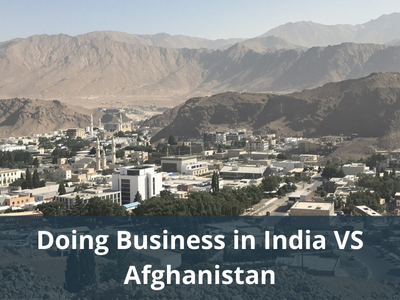Doing Business in India VS Afghanistan – A Comparison
 Entrepreneurs and investors often face a tough decision when choosing between India and Afghanistan as their preferred business destination. Both countries offer unique advantages, making the choice challenging. While India is renowned for its competitive landscape, high quality of life, and lower costs for setting up smaller businesses, Afghanistan provides untapped opportunities in emerging markets and strategic access to Central Asia.
Entrepreneurs and investors often face a tough decision when choosing between India and Afghanistan as their preferred business destination. Both countries offer unique advantages, making the choice challenging. While India is renowned for its competitive landscape, high quality of life, and lower costs for setting up smaller businesses, Afghanistan provides untapped opportunities in emerging markets and strategic access to Central Asia.
Key Comparison Points
Business Environment
- India: India boasts a stable political environment, a robust legal framework, and increasing government support for businesses, especially startups.
- Afghanistan: Afghanistan offers opportunities in an emerging market, but political instability and weak legal infrastructure remain key challenges.
Taxation
- India: India has a corporate tax rate of 22% (15% for new manufacturing companies), along with several tax incentives for startups and MSMEs.
- Afghanistan: Afghanistan has a flat corporate tax rate of 20%, which is competitive but lacks the extensive tax incentives seen in India.
Ease of Company Incorporation
- India: India’s incorporation process is streamlined with digital infrastructure and a supportive regulatory environment for foreign investors.
- Afghanistan: Afghanistan’s incorporation process is more traditional and bureaucratic, with limited digital infrastructure.
Cost of Living and Business Operations
- India: India offers low operational costs, affordable office spaces, and a reasonable cost of living, making it attractive for small businesses.
- Afghanistan: Afghanistan has lower living expenses but higher business operational costs due to limited infrastructure and security concerns.
Access to Markets
- India: India has excellent global connectivity and is part of several trade agreements, providing access to large markets.
- Afghanistan: Afghanistan offers strategic access to Central Asia but suffers from limited trade agreements and connectivity challenges.
Quick Comparison Overview
Here’s a quick overview of the key differences for easy reference:
| Factor |
India |
Afghanistan |
| Business Environment |
Stable political environment, strong legal framework |
Emerging market, political instability |
| Corporate Tax Rate |
22% (15% for new manufacturing companies) |
20% |
| Capital Gains Tax |
Applicable with exemptions for startups |
Flat rate applicable |
| Ease of Incorporation |
Streamlined with digital infrastructure |
Bureaucratic with limited digital tools |
| Business Costs |
Low operational and living costs |
Higher operational costs |
| Market Access |
Global connectivity and trade agreements |
Strategic access to Central Asia |

Benefits of Choosing 3E Accounting
When navigating the complexities of doing business in India or Afghanistan, partnering with a reliable corporate service provider like 3E Accounting can make all the difference. With expertise in starting a business in India, a step-by-step guide to India company registration, and India company incorporation, 3E Accounting ensures a seamless setup process tailored to your needs. For company setup or any other assistance, feel free to contact us. Choose 3E Accounting for a hassle-free experience and focus on growing your business with confidence.
Ready to Expand into India? Choose 3E Accounting Today!
Stay Secure, Stay Successful With 3E Accounting Services
Contact Us Now
Frequently Asked Questions
The corporate tax rate in India is 22% for most companies and 15% for new manufacturing companies.
Afghanistan has a flat corporate tax rate of 20%.
India offers a stable political environment and robust legal framework, while Afghanistan provides opportunities in an emerging market but faces political instability.
India’s incorporation process is streamlined with digital infrastructure, whereas Afghanistan’s process is more traditional and bureaucratic. Learn more about India company incorporation.
India has lower operational costs and affordable office spaces, whereas Afghanistan has higher operational costs due to limited infrastructure. If you’re setting up businesses in India, explore our guides for cost-effective solutions.
India provides excellent global connectivity and trade agreements, while Afghanistan offers strategic access to Central Asia but limited trade agreements. For help starting a business in India, we provide comprehensive resources.
Abigail Yu oversees executive leadership at 3E Accounting Group, leading operations, IT solutions, public relations, and digital marketing to drive business success. She holds an honors degree in Communication and New Media from the National University of Singapore and is highly skilled in crisis management, financial communication, and corporate communications.


 Entrepreneurs and investors often face a tough decision when choosing between India and Afghanistan as their preferred business destination. Both countries offer unique advantages, making the choice challenging. While India is renowned for its competitive landscape, high quality of life, and lower costs for setting up smaller businesses,
Entrepreneurs and investors often face a tough decision when choosing between India and Afghanistan as their preferred business destination. Both countries offer unique advantages, making the choice challenging. While India is renowned for its competitive landscape, high quality of life, and lower costs for setting up smaller businesses, 
